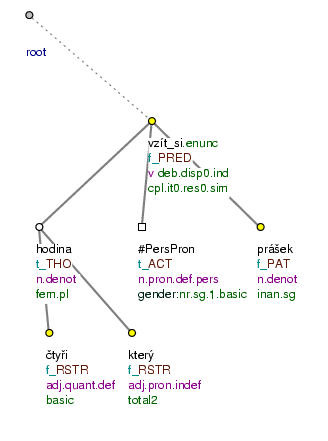- Definition of the
THOfunctor -
The
THOfunctor (temporal: how often) is functor for a free modification that expresses specification of time answering the question "how often?", or "how many times?". It expresses the frequency of an event or state expressed by the governing word.
THO modifications are usually expressed by direct specification of time (scházeli se denně (=they met daily)), but it can also be expressed by specifying the relation to another event (po každém dešti (=after every rain)).
Forms. The basic forms of THO modifications are:
-
prepositional phrase.
The most common forms:
po+6 po každém dešti (=after every rain) před+6 před každým deštěm (=before every rain) při+6 Scházeli se při každé příležitosti. (=They met on every occasion.) -
noun in a non-prepositional case.
The most common forms:
accusative Od března se hraje pravidelně každý čtvrtek. (=Since March they have played regularly every Thursday.) Example:
Každé čtyři hodiny.
THOsi musím vzít prášek. (=lit. Every four hours (I) - have_to take (a) pill.) Fig. 7.14 -
adverbial expressions.
Examples:
Scházeli se denně.
THO(=lit. (They) met daily.)Včera všichni trénovali dvakrát.
THO(=lit. Yesterday everybody trained twice.)O tom často.
THOrozhodla centrála. (=lit. About it often decided (the) central office.)Běžně.
THOchodil k svému lékaři. (=lit. Commonly (he) went to his doctor.)Každoročně.
THOjezdíme k moři. (=lit. Annualy (we) go to (the) sea.)Stalo se to už mnohokrát.
THO(=lit. Has_happened - (it) already many_times.)Opakovaně.
THOděláš chyby. (=lit. Repeatedly (you) are_making mistakes.)Pravidelně.
THOji navštěvujeme. (=lit. Regularly (we) her visit.) -
dependent clause.
The most common forms:
kdykoli/v Kdykoliv k vám jdu, nejste doma. (=Whenever I come to you, you are not at home.)
The THO meaning is often signalled by expressions like každý (=every), všechen (=all), krát (=times).
Agreeing form of an adjective. With nouns denoting events (nouns ending with -ní and tí; see Section 2.4.3.3, "Functors assigned to the non-valency modifications of nouns referring to events"), THO modifications can also be expressed by agreeing forms of adjectives.
Examples:
časté.THO poškozování zaměstnanců (=lit. frequent harm (to) employees)
opakovaná.THO jednání (=lit. repeated negotiations)
každoroční.THO vyúčtování nákladů (=annual account (of) costs)
několikanásobné.THO kontrolní měření (=lit. multiple check measure)
druhé.THO projednávání stížnosti (=lit.second discussion (of) (the) complaint)
Figure 7.14. The THO functor

Každé čtyři hodiny si musím vzít prášek. (=lit. Every four hours (I) REFL have to_take pill.)
Border with the TWHEN functor. THO often borders on the meaning "when?" (TWHEN; see Section 3.1, "TWHEN"). Frequency of the interval in which the governing event takes place does not have to follow directly from the temporal modification but it can be expressed by other means too (or it can be determined just by the context). The fact that the event is repeated can also follow from the plural form of a noun (within the prepositional phrase). In such cases the temporal modification is usually assigned the TWHEN functor. The THO functor is assigned, if the meaning "how often?" follows directly from the temporal modification. Cf.:
-
Pracuje každý pátek.
THO(=lit. (He) works every Friday.)The modification každý pátek (=every Friday) expresses both the temporal localization of the event (answering the question "when?") as well as the meaning "how often". The modification is assigned the
THOfunctor. -
Jezdívá v pátek.
TWHEN(=lit. (He) comes Fridays.)Přijíždí pravidelně v pátek.
TWHEN(=lit. (He) comes regularly on Friday.)Přijíždí v pátek.
TWHEN(=lit. (He) comes on Friday.)The modification v pátek (=on Friday) expresses the temporal localization of the event (answer to the question "when?") and the fact that the event is repeated follows from the context (e.g. the verbal aspect). The modification is assigned the
TWHENfunctor. -
Scházejí se po večerech.
TWHEN(=lit. (They) meet - in_the_evenings.)Navštěvují se o velikonočních nedělích.
TWHEN(=lit. (They) visit each_other on Easter Sundays.)The modifications po večerech (=in the evenigs) and o velikonočních nedělích (=on Easter Sundays) express the temporal localization of the event (answering the question "when?"), the context (plural form of the nouns) signals the repetition of the event. The modification is assigned the
TWHENfunctor.
In the constructions with a dependent temporal clause, the meaning "how often?" usually only concerns the event that is expressed by the governing verb of the dependent clause; the entire dependent clause, however, usually has the meaning of the TWHEN functor w.r.t. its governing clause; e.g.:
Obvykle.THO když přijdeš.TWHEN, nejsem doma . (=lit. Usually when (you) come, (I) am_not at_home.)
The meaning "how many times before". A modification with the THO functor expresses ferquency/regularity of the interval in which the event or state expressed by the governnig word takes place; this must be distinguished from the meaning "how many times before" which does not imply any repetition. The meaning " how many times before " is therefore represented by the TWHEN functor. Cf.:
-
Zazvonil dvakrát.
THO(=lit.(He) rang twice.) -
Zazvonil podruhé.
TWHEN(=lit.(He) rang (for) (the) second_time.)